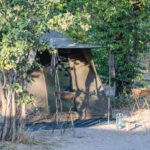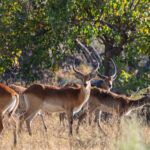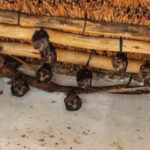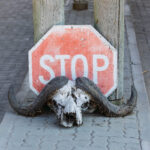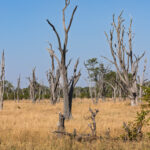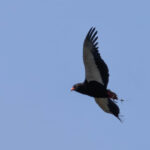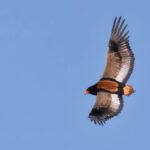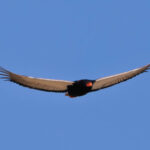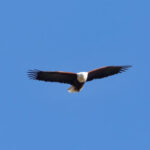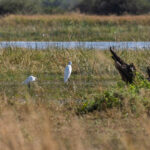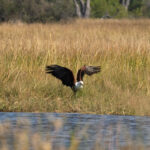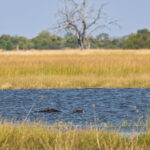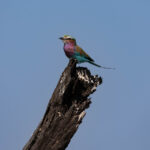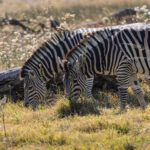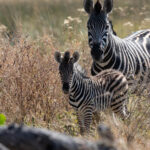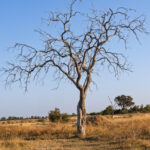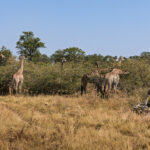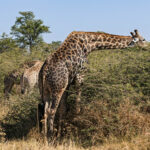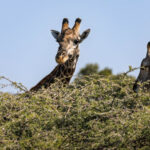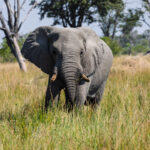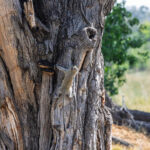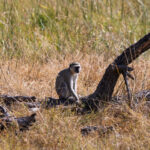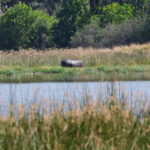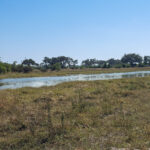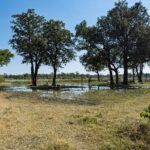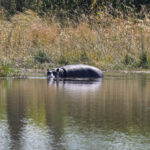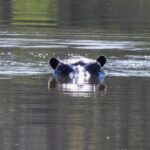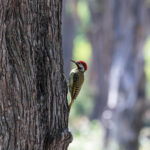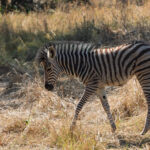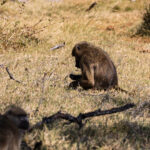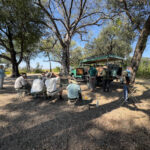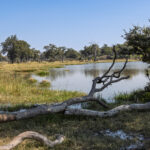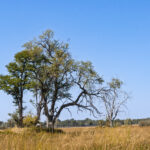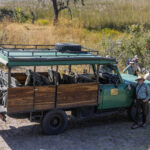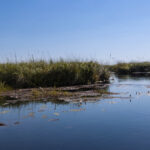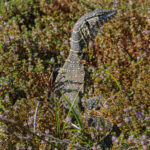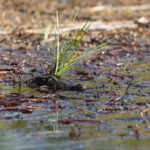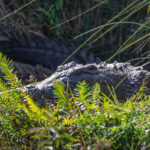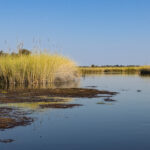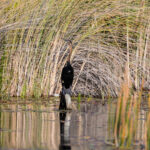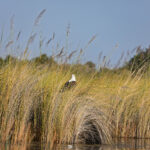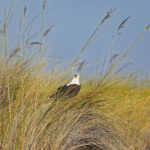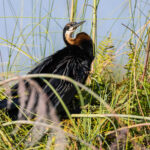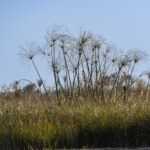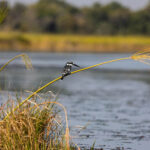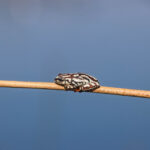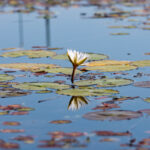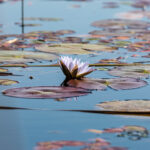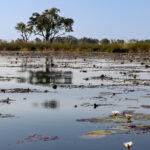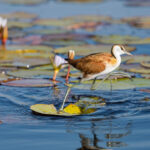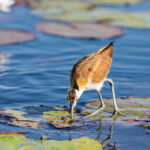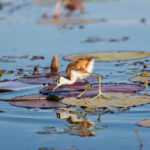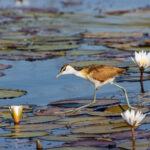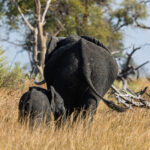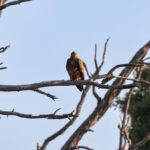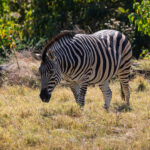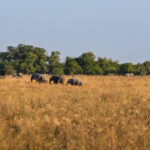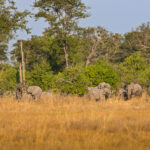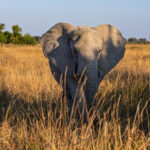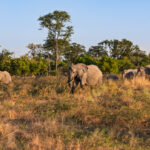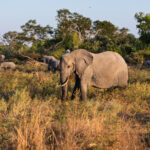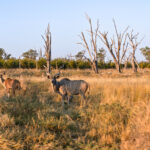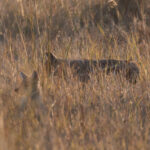Saturday, 7 June 2025
We enjoyed a warm and cozy night in our tent. We followed Wian’s tip to put the grey blanket underneath us and then used the fleecy blankets on top of our duvets. We both slept warmly enough, despite the overnight temperature dropping into single figures.
At 6.40am we had our wake up call, letting us know that our canvas basins at the front of our tents had been filled with fresh, warm water. After showering last night, we just had a quick freshen up this morning before breakfast. Making our way to the mess tent we found an impressive spread of breakfast options had been prepared for us by the camp kitchen.
After our early breakfast, we piled back into the International truck and we were off on today’s game drive just before 8.00am. Boasting one of the richest and most diverse ecosystems in the world, our itinerary claims that Moremi is unrivalled in its beautiful scenery and splendid array of birds, animals and plants.
At the moment the delta is just starting to fill with all the water being delivered by the Okavango River. The river rises in Angola and after flowing along the border between Angola and Namibia and then into Botswana, it starts to fill the delta from around mid-May onwards. The system is a little bit similar to the rain falling during wet season in Australia’s gulf country being delivered months later to Lake Eyre in outback South Australia.
Our first animal this morning was a Steenbok, followed by the now somewhat ubiquitous hornbills. We turned into the area of the park known as Paradise, where we found red lechwe. Solomon identified some lion tracks and there were rumours of a leopard sighting. We made a civilised toilet stop at the facilities at one of the reserve’s other gates, where we also saw some new wildlife, tiny bats hanging under the eaves. Those aren’t seeds on the ground, they’re bat scat!
We saw zebras and common impala as we made our way towards the location of the leopard sighting. Arriving at the site, we circled the copse of trees that the leopard had allegedly been seen entering. We scoped out that copse of trees until we just about knew every leaf and twig in it BUT … no leopard was seen.
A bateleur eagle was sighted just before we pulled up by the water for our morning tea break. From our vantage point we had a pretty good look at an African fish eagle on the other side of the water and we could see the backs of hippos grazing in the lake. After tea we went back to stalking the leopard in the copse of trees. Honestly, it was a bit like round and round the mulberry bush and, ultimately, we had to move on with no leopard sighted.
We drove on and saw a lilac-breasted roller, hornbills, Burchell’s starlings, cattle egrets, red lechwes and more impala. We turned around and, after one more circuit of the alleged leopard lair, it really was time to move on. Luckily, we are birdy nerdies and we were still pretty happy with the variety and number of birds we were seeing, even if that leopard continued to elude us.
More zebras – or as Wian calls them, donkeys in pajamas – a lovely tower of giraffes feeding on a stand of candle pod acacias, elephants, and a group of male red lechwe. Some primates, in the form of vervet monkeys and then some reptile action, a crocodile sunning itself on the water’s edge.
After seeing a couple of zebras, we spotted a herd of elephants near the water. Solomon tried to drive us closer but already the water has encroached on the access track that he would have been able to use a couple of weeks ago. And the list goes on: African fish eagle, impalas, hippo, hippo, water monitor, elephant. Something new, a bearded woodpecker before more impala, another elephant and more zebras. It was lovely to see a troop of chacma baboons in the wild rather than scavenging on the outskirts of town. Thank goodness some of them still live their best life in the reserve.
Our last sighting before taking a lunch break was a yellow-billed stork. Once again, Solomon dropped the side of the truck, then spread a tablecloth on it before putting out today’s lunchtime buffet. Yet more delicious food supplied by the excellent chef in charge of our camp kitchen. We lunched in the camping area near the permanent lagoon Xaxanika, so we were spoiled with facilities again … after Wian checked to make sure there were no baboons lurking inside. Wow, this time we had windows and natural light but … it was BYO paper. Wian fixed us up with that too! He’s looking after us very well.
With lunch finished, it was time to take a boat cruise with Blade on the lagoon. We wound our way through the reeds with Blade pointing out a water monitor, small crocodile and white, lilac and yellow water lilies. While we were still making our way out to the lake we spied another water monitor, a much larger crocodile and an African darter (aka snake bird).
We left the reed channels behind us and made our way out into the huge expanse of Xaxanika, the largest permanent lagoon in Moremi. We continued to see plenty of bird life: African fish eagle, African darter and pied kingfisher. Blade stopped the boat and picked out a reed upon which clung an Angolan reed frog. Being a bit of a poser, the frog stayed on the length of reed while we passed it from hand to hand to have a closer look and take photographs.
We saw a family of jacanas. First, a juvenile from last year’s clutch, then the two surviving chicks (of four) that were hatched this year. Finally we saw the daddy jacana who apparently is in charge of watching the chicks while their mother is off finding a new partner!!
As our cruise neared its furthest outward bound point, we spotted our biggest crocodile yet, an absolute monster! Soon after we reached our turn around point, at a spot called Elephant Crossing, and we were lucky enough to see elephants there. Still not tired of elephants! Blade spun the boat around and treated us to an exhilarating ride back to the dock, opening the throttle and skimming back across the lake at high speed. He only slowed down marginally when we re-entered the reed channels, expertly swishing us through the S-bends until we pulled up back at the dock. Obviously no speed limits here to reduce the wash!
Wian and Solomon met us at the dock and we climbed aboard the truck again to start the journey back to camp. More zebras, antelopes (probably impalas), another lone elephant, waterbuck and a massive breeding herd of elephants. After one last hopeful turn around the leopard’s lair (alleged!) we saw a hippo in the distance and then Solomon drove us closer to the herd of elephants. So many elephants, including several calves. It was very exciting.
With the sun getting lower in the sky we started to head back to camp with a little more speed. Solomon has to be back at camp before dark or risk a fine. Bernie called ostrich but the black and white flash that he saw was actually three southern ground hornbills coming in to land. They were quite a long way away. Easy mistake to make?! And certainly not the first incorrect call made by our group during the day. Wian and Solomon were constantly telling us the correct names.
More zebras, kudu and some side-striped jackals as we motored along. The late afternoon sun was beautiful on the trees beside the road making them look much more autumnal than they did this morning. We were overtaken by some rangers who reminded Solomon that he needed to make camp before dark. After a few more kilometres, we caught up to the rangers finding they had stopped to collect some firewood. We wondered if they had stopped to kill some time to give Solomon a chance to be back at camp before they had to issue him with a fine??
Phew, we made it into camp before full dark. The staff had warm water ready in our buckets so we could shower before we were out of light completely and they had the campfire already glowing in the low light of early evening. Very welcoming indeed.
Tonight, we started with sweet corn soup, before enjoying BBQ meats and vegetables, followed by English trifle for desert. The catering for our bush camping experience has been outstanding. But then, food always tastes better when you haven’t had to prepare it yourself.
After dinner we spent a bit more time around the bush TV (campfire) with Solomon and Wian telling more tall tales about their experiences guiding visitors to Africa.
Steps: 17,395 (12.14kms) I think it might actually be fraudulent recording these figures!


